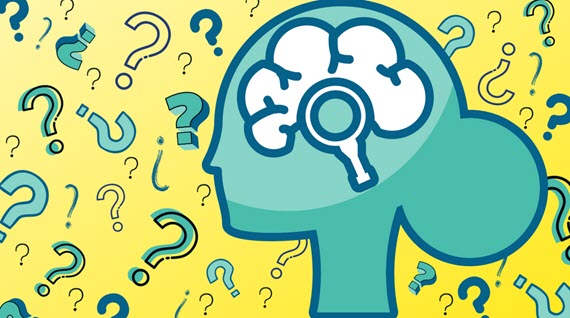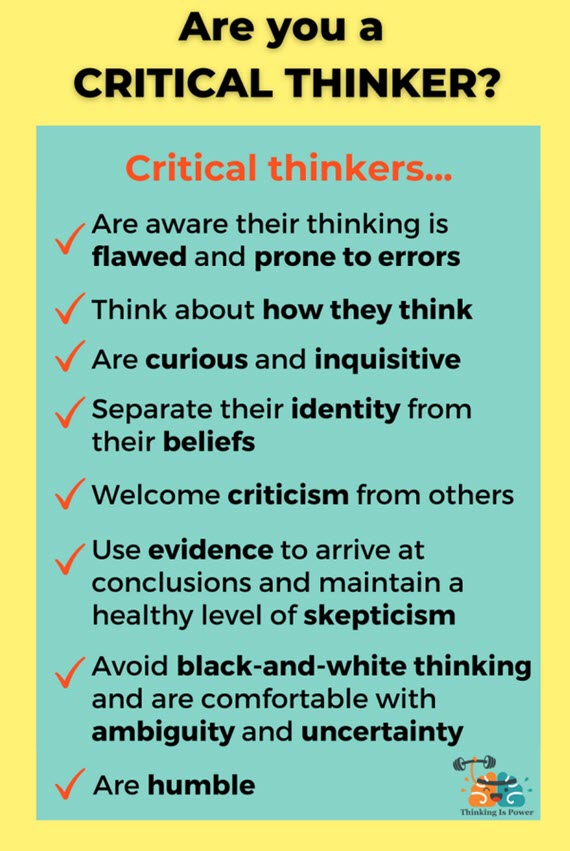Thinking is Power: Are you a Critical Thinker?
Posted on 1 September 2021 by Guest Author
 This is a re-post from the Thinking is Power website maintained by Melanie Trecek-King where she regularly writes about many aspects of critical thinking in an effort to provide accessible and engaging critical thinking information to the general public.
This is a re-post from the Thinking is Power website maintained by Melanie Trecek-King where she regularly writes about many aspects of critical thinking in an effort to provide accessible and engaging critical thinking information to the general public.
Learn how to think, not what to think
Everyone thinks. And everyone thinks they’re good at thinking.
But good thinking is hard, and it doesn’t come naturally. It’s a skill that has to be learned and practiced. Our brains are adapted to keep us alive by making quick decisions to avoid predators and by forming strong emotional bonds with members of our tribes. Trusting that your brain inherently knows how to reason is a recipe for being misled. And it doesn’t matter how smart or educated you are. No one can lie to us better than we can.

Unfortunately, many of those who are most convinced that they are the true critical thinkers are actually doing the exact opposite. We all know who they are. They confidently air their opinions as fact and hide factually incorrect assertions behind an “opinion shield.” They oversimplify complex issues and are unwilling or unable to entertain nuance and detail. Due to a lack of substantive arguments, they resort to childish name-calling (eg “sheep,” and “fake news”), and proclaim that those who disagree with them are “stupid” and need to “think for themselves.” Ironically, they have inoculated themselves against critical thinking…..if you’re convinced you’re using “evidence” and “logic” and “know the truth,” why would you entertain the possibility that you’re wrong and need to learn new skills?
Yet few things are as empowering as the ability to think well. Critical thinking can help us make better decisions and solve problems, and can prevent us from being fooled or harmed.
Knowledge may be power. But it’s impossible for any one person to know everything…. which is why this site is called Thinking Is Power. Besides, real knowledge is more than memorizing a bunch of facts. Knowledge is a process. And in a world of unlimited information, from unlimited sources, we need to equip ourselves with a better way of thinking.
So what is critical thinking? And how do you know if you’re a critical thinker?
There are countless definitions of critical thinking. Basically, critical thinking is the self-directed process of analyzing and evaluating information to decide what to believe or how to act.

Critical thinkers:
- Are aware that their thinking is flawed and prone to errors. They recognize that their perceptions may not be accurate and that their memories are imperfect. And they understand that their brains take shortcuts to help them make fast and easy decisions, potentially leading to biased thinking.
- Think about how they think. They ask themselves how and why they know something and actively search for their knowledge blindspots and biases. They avoid emotional reasoning and intuition and instead activate higher-level thinking that is slower and more deliberative.
- Are curious and inquisitive. They want to learn, so they ask questions. Importantly, they are open to the answers, even if it’s not what they want to hear.
- Separate their identity from their beliefs. They recognize that it’s difficult to critically challenge beliefs that are important to their sense of self. They want to believe in things that are true, and not believe in things that are not true, even if it’s uncomfortable. Essentially, they would rather get it right than be right.
- Welcome criticism from others. They recognize that arguments are a collaborative process of searching for the truth, and are able and willing to fairly evaluate other points of view.
- Use evidence to arrive at conclusions and maintain a healthy level of skepticism. They are open to all claims, but require sufficient evidence before accepting them. They know that extraordinary claims require extraordinary evidence, and claims made without evidence can be dismissed without evidence.
- Avoid black-and-white thinking and are comfortable with ambiguity and uncertainty. They recognize the world is complex and nuanced, and that distilling issues into two extremes can prevent them from understanding problems and finding solutions.
- Are humble. They are honest with themselves about what they know and don’t know, and avoid being overly confident. They recognize they might be wrong and are willing to change their minds. And they value others’ expertise.
Critical thinking is a journey. It’s not easy, and there is always room for improvement. Many of us need to re-learn habits developed over a lifetime. But the world is full of misinformation and BS, and the best way to avoid being misled is to take control of your thinking.
Simply put: Critical thinking is empowering.































 Arguments
Arguments






























Comments